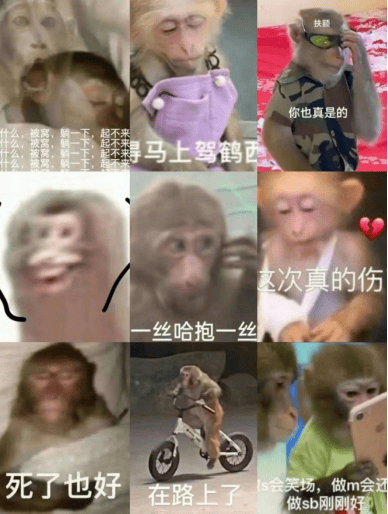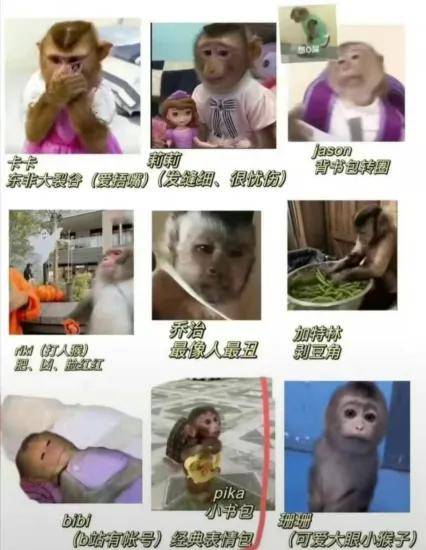|
“吗喽文学”在一晚上之间作为网络顶流,一张张可爱又幽默的表情包,展现了当代青年人漂亮的精神情况。
 (图源网络) (图源网络)
有几只可爱的吗喽更加是作为网红,热情网友还专门制作了图例用以区分。
 图源网络 图源网络
“吗喽特效”亦一样出此刻各大APP上,带上“吗喽”标签的事物,都能快速导致网友们的重视。

乃至某奶茶品牌亦趁热打铁,和吗喽联名。

1、因此吗喽文学到底是什么?
吗喽,是两广地区的方言,意为“猴子”。而所说的“吗喽文学”,网传是起源于一个砂糖橘的段子:因为2022年年初砂糖橘上市太晚,等不及的网友只好喊话商家催单,给商家带来了不小的压力,于是商家就将自己比作“吗喽”,叫作“吗喽的命亦是命”,暗指网友别再催了。
有人说,吗喽不像哈基米那样,只要依靠卖萌就能够讨取人们的欢心。做为一只普通的猴子,它只能依靠自己的持续奋斗,来实现自己想要作为齐天大圣的梦想。
然而,就算是这般,吗喽亦并无放弃自己的理想,依旧梦想着站在花果山的最顶端。就如同当今社会的打工人通常,即使躺平了亦依然抱有梦想,坚决不摆烂。
能够说,“吗喽文学”看似是一种积极、幽默且阳光的生活态度,其实亦是当代青年人的一种自嘲,是一种“自黑式幽默”。
2、有什么和吗喽相关的英语表达呢?
1. Monkey See, Monkey Do
用来形容一个人不加思考地模仿另一个人。其结果常常是使自己看起来很愚蠢。
Meaning: an expression used to describe someone who has imitated another person usually without thinking. It often results in the person looking foolish.
例句:你要重视自己的言行。由于你儿子在这儿,他会有样学样的。
Use In A Sentence: You must behave yourself, for your son is here. Monkey see, monkey do.
2. A Monkey On One’s Back
用来形容一个人难以摆脱或处理的问题。
Meaning: a problem that one has difficulty getting rid of or solving.
例句:我很高兴能摆脱这个问题。我已然为这个项目连续工作了两个月,完成它的感觉确实不错。
Use In A Sentence: I am so glad to get this monkey off my back. I having been working on this project for 2 months straight. It sure does feel good to finish it.
3. Cheeky Monkey
用来形容人调皮或愚蠢。
Meaning: used to describe a person who is mischievous or sillzzy.
卡梅伦有点调皮,他总是趁哥哥不重视时把饼干罐藏起来。
Use In A Sentence: Cameron is a bit of a cheeky monkey. He always hides the cookie jar when his brother isn’t looking.
4. If You Pay Peanuts, You Get Monkeys
意思是倘若你给的工资低,你就不可指望得到最好最熟悉的工人。
Meaning: if you pay low wages you can’t expect to get the best most skilled workers.
例句:好吧,倘若你想要更好的工人,你就必须供给更好的工资。记住,倘若你给花生米,你只能得雇到猴子。
Use In A Sentence: Well, if you want better workers you need to offer a better wage. Remember, if you pay peanuts, you get monkeys.
5. To Monkey Around
用来形容浪费时间或胡闹。
Meaning: to waste time; to fool around.
例句:电影五点才开演,所以咱们决定去市中心打发时间。想来吗?
Use In A Sentence: The movie isn’t until 5:00 so we’ve decided to monkey around downtown for a bit. Want to come?返回外链论坛:www.fok120.com,查看更加多
责任编辑:网友投稿
|